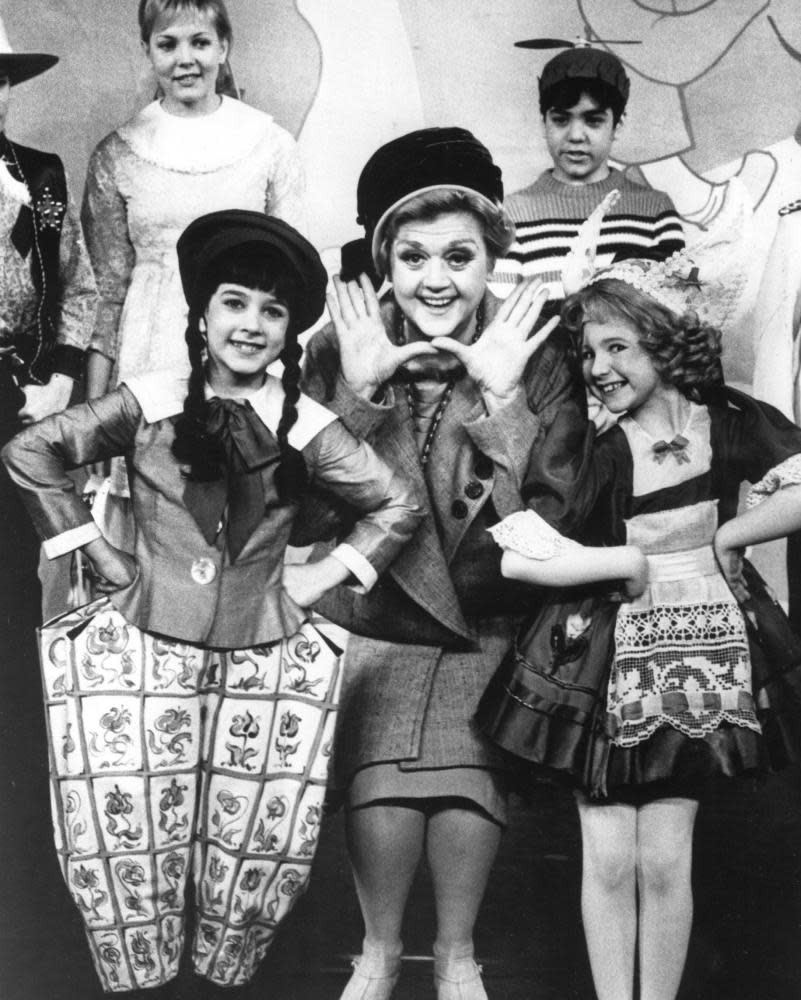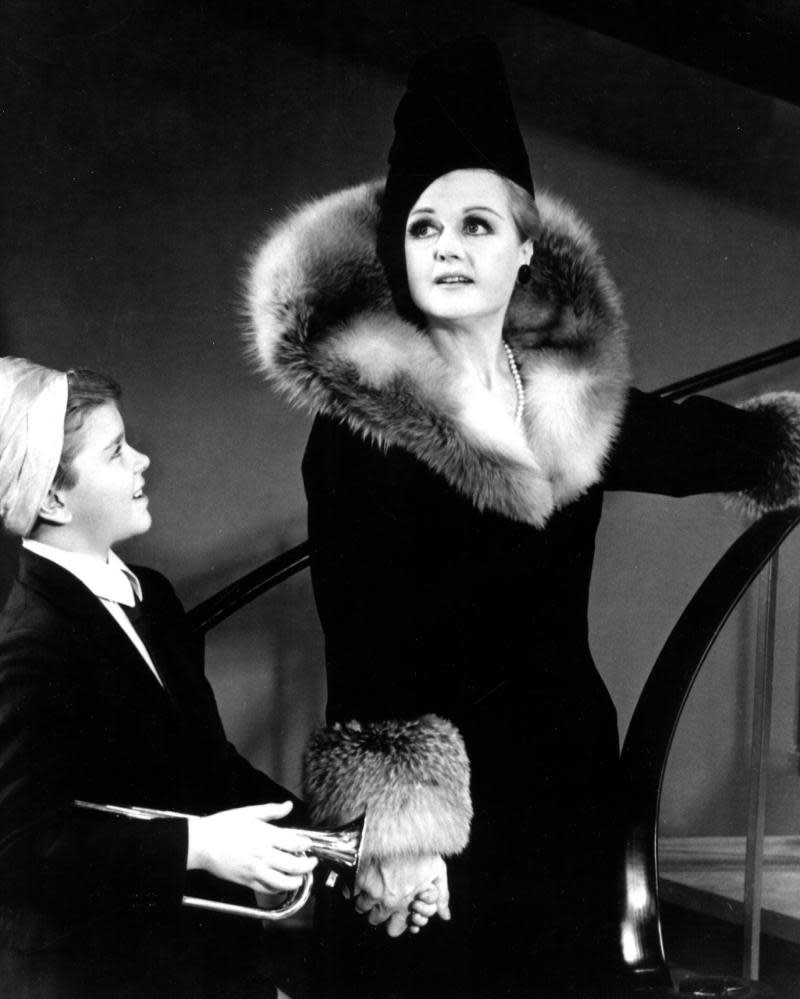Dame Angela Lansbury obituary
Although she was born in London, and retained a classic English poise all her life, Angela Lansbury, who has died aged 96, was a Hollywood and Broadway star for more than seven decades, and one who was completely unclassifiable. On her film debut, she played Ingrid Bergman’s cockney maid in George Cukor’s Gaslight (1944) and was promptly nominated for an Oscar, though she was never to win one. She graduated to play Laurence Harvey’s evil, possibly incestuous, mother – although she was only three years older than Harvey – in John Frankenheimer’s The Manchurian Candidate (1962), and then a dotty amateur witch in Disney’s follow-up to Mary Poppins, Bedknobs and Broomsticks (1971).
This versatility, allied to her natural grace, vitality and chastely appealing features – her eyes were full, blue and unblinking, her face almost perfectly round, her mouth a cupid’s bow from the studio era – propelled her to stage stardom in Jerry Herman’s Mame (1966) and, in London at the Piccadilly theatre in 1973, as the show-stopping Mama Rose in Gypsy, by Jule Styne, Stephen Sondheim and Arthur Laurents.
Lansbury had been initially reluctant to assume Ethel Merman’s mantle in Gypsy but, like Merman, she gave the performance of her life, full of steel and tenderness in equal measure. Her performance was more nuanced and needy than Merman’s; the critic Robert Cushman described “a slow steady build towards magnificence”.

But she became best known worldwide for Murder, She Wrote, an American television series running from 1984 to 1996, with four subsequent TV films. She played the incisive and level-headed Jessica Fletcher, a retired English teacher, mystery writer and amateur sleuth in the coastal town of Cabot Cove, Maine, a sleepy location with a criminal body count as delightfully high and unlikely as in Midsomer Murders.
“It really was a fluke success,” said Lansbury, “and came at a time when that kind of family entertainment seemed needed.” She added that, of all the characters she played in her career, Fletcher was the one most like herself: intuitive and sensitive, a voice of calm and reason in a troubled time. She gradually assumed ownership of the series, which was networked by CBS. Peter Shaw, whom she had married in 1949, was joint director of the production company; her son, Anthony, and stepson, David, acted as executive producers, and her brother Bruce as supervising producer.
Family was always of paramount importance to Lansbury. She came from strong, muscular stock: her father, Edgar Lansbury, was a lumber merchant and one-time member of the Communist party and mayor of Poplar (his father was George Lansbury, a reforming leader of the Labour party and East End hero); her mother, Moyna MacGill, was an Irish actor who took Angela to the Old Vic theatre in London from an early age. One of her cousins was Oliver Postgate, the British animator best known for Bagpuss.
She was educated at South Hampstead high school for girls and trained at the Webber Douglas Academy of Dramatic Art. Her father died in 1934, and her mother merged her family – Angela and her younger twin brothers, Edgar and Bruce – with that of a former British Army colonel in India, Lecki Forbes, under one roof in Hampstead.
It was not a happy arrangement.
At the outbreak of war, Moyna decamped with her children to New York, and Angela continued her training for two more years at the Feagin school. While her mother toured Canada in a variety show for the troops, Angela did cabaret turns in Montreal. When Moyna’s agent sent her to Hollywood for an audition, she decided to move the children out there with her.
Nothing much happened at first, so mother and daughter took jobs as sales clerks at Bullocks Wilshire, the art deco department store in Beverly Hills, while continuing to audition. Angela was still only 17 when she landed the role in Gaslight, and this set a pattern of playing older than her age. A notable exception was The Picture of Dorian Gray (1945), in which she played Sibyl Vane, the chirpy music-hall singer, a role that brought her second Oscar nomination; through her co-star, Hurd Hatfield, she met her future husband, Shaw. She had been married previously, for just nine months, to the actor Richard Cromwell, who was almost twice her age.
By this point a Hollywood fixture, Lansbury played Elizabeth Taylor’s older sister in National Velvet (1944), sang Jerome Kern’s How’d You Like to Spoon With Me? in Till the Clouds Roll By (1946), fooled with Danny Kaye in The Court Jester (1955), peaked in glory in The Manchurian Candidate, with her third and final Oscar nomination, and joined another great cast list in The Greatest Story Ever Told (1965), which David Lean took over as director from George Stevens.
Lansbury took American citizenship in 1951, and made her Broadway debut opposite Bert Lahr in Feydeau’s Hotel Paradiso in 1957, following with Helen in Shelagh Delaney’s A Taste of Honey in 1960 and, most significantly, Cora Hooper Hoover, the corrupt mayor, in Stephen Sondheim and Arthur Laurents’s 1964 flop Anyone Can Whistle. The show, which has since become a concert favourite, closed in a week, but Lansbury came out of it with flying colours, commended by critics for her agility and engaging personality; she was even likened to a young Bette Davis.

This led to her Mame acclaim, and her first Tony award. Lansbury played Auntie Mame, a free-spirited woman who picks herself off the floor of the stock market crash to sing Bosom Buddies (Lansbury duetted with Bea Arthur) and who ultimately recoups her fortunes by marrying a southern aristocrat. She won a second Tony in Herman’s next show, Dear World (1969), a musical based on Jean Giraudoux’s The Madwoman of Chaillot, in which she appeared to be dressed in “a wedding cake made of cobwebs”, said the critic Walter Kerr.
A belated London debut followed in 1972, when she joined the Royal Shakespeare Company at the Aldwych in Edward Albee’s All Over, playing the mistress of a dying man, locked in battle with Peggy Ashcroft as his wife. She took Gypsy back to Broadway in 1974 for a few months, winning her third Tony, then joined the National theatre at the Old Vic in 1975 to play a fairly youthful, glamorous Gertrude to Albert Finney’s thickset, plainspoken and powerful Hamlet, directed by Peter Hall; the production was part of the opening season in the National’s new home on the South Bank in 1976.
Back on Broadway, she hit another great milestone in Sondheim and Hugh Wheeler’s Sweeney Todd (1979), playing the gleefully cannibalistic, pie-making Nellie Lovett (and winning a fourth Tony) opposite Len Cariou’s demon barber in a dark and scintillating production by Hal Prince that played on Broadway for a year before touring the US for another 11 months.
Before Murder, She Wrote, a series of starry film roles included John Guillermin’s Death on the Nile (1978) with Peter Ustinov, David Niven, Bette Davis, Mia Farrow and Maggie Smith; Guy Hamilton’s The Mirror Crack’d (1980), in which she did some sleuthing stretches by playing Agatha Christie’s Miss Marple, with Elizabeth Taylor, Kim Novak, Tony Curtis and, in his penultimate movie, Rock Hudson; Wilford Leach’s rocked-up The Pirates of Penzance (1983) opposite Kevin Kline as the Pirate King; and Neil Jordan’s wonderfully weird The Company of Wolves (1984), in which she played yet another eccentric old granny figure.
She did voices for two animated Disney movies – Beauty and the Beast (1991) and Anastasia (1997) – but was not in a feature movie again until she played Great Aunt Adelaide in Kirk Jones’s Nanny McPhee (2005), starring and written by Emma Thompson. Subsequently, she was with Jim Carrey in Mr Popper’s Penguins (2011).
For many years, Lansbury kept a home in County Cork, Ireland, where she and Shaw would spend two months each year while maintaining their base in Redwood, Los Angeles. She rented an apartment in New York in 2007 to return to Broadway in Terrence McNally’s Deuce, a specially crafted two-hander for her and Marian Seldes about former tennis partners reliving past glories while watching a match at Flushing Meadow, and switching their heads from side to side during the rallies.
The play was not a huge hit, but Lansbury was electrifying, winning a fifth Tony award, and was greatly moved by the affection with which audiences greeted her. She had not been on Broadway since a possibly ill-advised 1983 revival of Mame.
Regarded by now as a national treasure, she returned in 2009 as Madame Arcati in Noël Coward’s Blithe Spirit, wearing a bright red wig, said Ben Brantley of the New York Times, “with a superfluity of bad jewellery, the gait of a gazelle and a repertory of poses that bring to mind Egyptian hieroglyphs”.
At the end of the same year in New York, she appeared for six months as Madame Armfeldt in Trevor Nunn’s Menier Chocolate Factory revival of Sondheim and Hugh Wheeler’s A Little Night Music, winning plaudits for her nostalgic litany of fading qualities in Liaisons: “Where is style? Where is skill? Where is forethought? Where’s discretion of the heart? Where’s passion in the art? Where’s craft?”
The Academy of Motion Picture Arts and Sciences compensated for her lack of an Oscar with an award for “some of cinema’s most memorable characters” in 2013, and the following year she was made a dame, and took Madame Arcati to the Gielgud theatre in London. She was Aunt March in the BBC’s adaptation of Little Women (2017), and in 2018 she both appeared as a balloon-seller in Mary Poppins Returns, and joined up with another member of that cast, Dick Van Dyke, as guardian angels in the Christmas tale Buttons.
Shaw predeceased her in 2003, and she is survived by Anthony, David, her daughter, Deirdre, three grandchildren, five great-grandchildren and her brother Edgar.
• Angela Brigid Lansbury, actor, born 16 October 1925; died 11 October 2022

 Yahoo News
Yahoo News 
